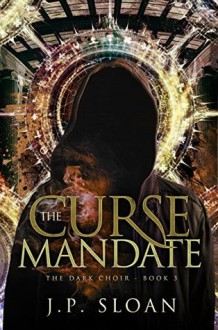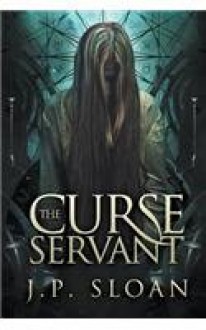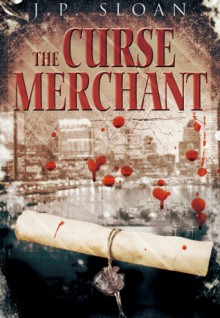
I've been procrastinating on this review for months, to the point that I've even been avoiding BookLikes and Goodreads. No matter how it looks, I don't enjoy writing negative reviews, particularly of series that I previously enjoyed. I really wanted to like The Dark Interest. I've relished the rest of the series: I like the magic system that Sloan sets up, the affectionate familiarity with the city of Baltimore, and I even enjoy disliking jerkish antiheroic protagonist, Dorian. The series has routinely gone in directions I didn't experience, often leading to the tarnishing and darkening of Dorian's character. I've found it fun because it's so unexpected.
Sure, there were some rough elements, some moments that made me wince, particularly in the first book. But this book took it to a whole new level, and in ways that can't simply be dismissed as a jerkish protagonist's warped perspective. Fair warning: because some of my issues with the book are major aspects of the plot, there may be spoilers from here on out.
In recent years, Baltimore has been central in a nationwide struggle over race, police brutality, and equal justice. In 2015, following the death of Freddie Gray in police custody (and Tyrone West in 2013), the city erupted into mass protests that led to a declaration of emergency, enforced curfew, deployment of the National Guard, dozens of fires, and hundreds of arrests. For years afterwards, national news was riddled with stories of mass demonstration, civil unrest, and arrests of protesters. Despite it all, all six police officers associated with the tragedy were acquitted or had charges dropped against them. More recently, Baltimore police have been arrested for racketeering and caught on the bodycams they thought were turned off planting evidence to incriminate suspects. Long story short, like many cities in the US, a conversation on equal justice is an inescapable part of the reality of the city.
In The Dark Interest, Sloan brings up that conversation, but in the most tonedeaf way imaginable. A riot erupts when the story starts, and Dorian being Dorian, his major concern is whether his restaurant will be destroyed or whether the riots will generate "a vibrant dinner rush." . Much of the subsequent plot involves the Baltimore riots, without ever quite saying as much. More specifically, he appropriates them as a plot point and attributes the anger to supernatural forces:
"Even though all of this was very real, this uprising wasn't a natural process. Long in coming though it may have been, this violence was engineered. Angry, ancient forces were pushing this city over a tipping point it might not pull back from."
"That's what this Summer of Blood is all about. Don't you see it? They're cranking up the heat."
I'm generally uncomfortable with this sort of twisting and belittling of history, but when the wounds are still so raw and the struggle is still ongoing? There are tragedies it is utterly unacceptable to appropriate, conflicts that it is repugnant to twist and debase and minimize and devalue. America's current conversation about race and justice is one of them.
The problems with this book don't stop there. Much of the story involves the "Jokomo Gang," a Black gang from New Orleans "displaced by Hurricane Katrina" . The members are described as "into drugs and guns" . Their brand of magic is described by Dorian as follows:
"It's not African voudou. It's Louisiana flavor, which blends lots of horrible shit from the Catholic Church, Santeria, and basically anything else the Dark Choir decided to toss into that gumbo pot."
The practitioners are termed
"Reckless dabblers. They stir up primal beings that rage unrestrained and unstewarded into our world."
The leader, Lasalle, is called a "wannabe crime lord" , "a hoodlum" , "an outright criminal" , and the "lead thug" . Lasalle is portrayed as a slow-witted, surly, angry, immature Black man who Dorian actually castigates a "acting like a child." Just in case you're in any doubt about the dog whistles going on here, Dorian later casually accuses the gang of "Get[ting] their free ride in Baltimore."
When the gang confronts Dorian, questioning him about his recent actions, the "good cop" protagonist appears to "save" Dorian by harassing and belittling them without apparent cause, going so far as to refer to them as "boys": "You boys raising a ruckus out here?" If you don't understand why referring to African-American men as "boys" is toothclenchingly offensive, I'm happy to point you to some references. But in the book, this is portrayed as a heroic rescue against a gang of "your basic street thug[s]" . At another point, Dorian ends up in a police station and assumes that everyone else behind bars-- all African-American-- are "probably wondering what a man like me was up to in a police station." (emphasis mine).
Things began less than optimally when Dorian stops a kid--poor and African-American, naturally-- from committing a theft, and they have a conversation in the author's attempt at dialect. It went downhill from there. I was mystified when Dorian jumped to the conclusion that the kid from the intro was running with the Jokomos-- the only thing I can imagine is he assumes all Black kids are muggers and gang members and all of "them" stick together. There is absolutely no other reason to think that. And of course, naturally, a Black kid is the mugger. Of course, there were other things that pissed me off about the book. Dorian has always been a jerk, and his level of jerkhood in this book is over the top. He decides he deserves to run the city because he can trust no one else. He has no principles other than self-preservation. He decides that he "had to betray Choi" to save himself. Why not just take consequences for his own actions rather than destroying someone else's life? At the very least, he shouldn't pretend he was forced into that choice-- he could have chosen to accept responsibility.
I wanted to like this book. I really did. And actually, even though it infuriated me, I found it interesting to explore the perspective of a character so imbued with white privilege that his only thought during a mass protest against police brutality is whether he'll get a dinner rush. But what I have real trouble with is the unexamined nature of much of the prejudice; the thoughtless, caustic nature of the white privilege that imbues it.
Maybe if you understand what this book is going in, you can get past all this, but I couldn't. That doesn't mean I won't give the next book a try; I'm constantly fascinated by how far down Dorian can be dragged, and the ending is a zinger.
Okay, that's all from me. At least now you know why I've been procrastinating and avoiding Goodreads for these last few months.
~~I received this ebook through Netgalley from the publisher, Curiosity Quills Press, in exchange for my (depressingly) honest review. Quotes were taken from an advanced reader copy and while they may not reflect the final phrasing, I believe they speak to the spirit of the novel as a whole.~~
Cross-posted on Goodreads.

 Log in with Facebook
Log in with Facebook 










